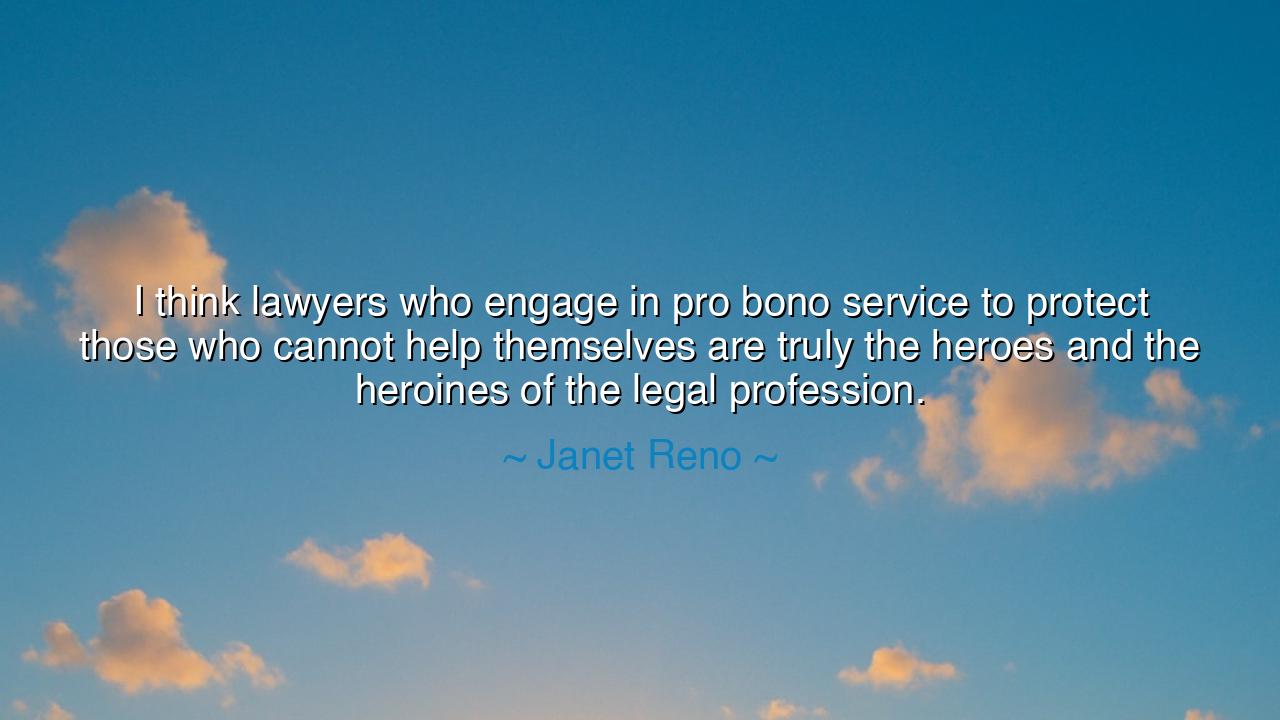
I think lawyers who engage in pro bono service to protect those
I think lawyers who engage in pro bono service to protect those who cannot help themselves are truly the heroes and the heroines of the legal profession.






Hear, O seeker of justice, the voice of Janet Reno, who declared with reverence: “I think lawyers who engage in pro bono service to protect those who cannot help themselves are truly the heroes and the heroines of the legal profession.” In this statement is not merely praise for a profession, but a profound truth about the role of power, duty, and compassion. For what is the purpose of law, if not to shield the weak from the strong, to guard the innocent, and to uphold the dignity of every human soul?
The ancients knew that the greatest power is not to dominate, but to defend. The philosopher Cicero taught that laws are written for the helpless no less than for the powerful, for without guardianship the law becomes a tool of tyranny. Reno echoes this eternal wisdom when she speaks of pro bono service—the voluntary offering of legal strength to those who lack the coin to purchase it. Such acts are not compelled by statute nor rewarded by gold, but by the deeper call of honor. In this, the lawyer ceases to be a mere practitioner of trade and becomes a champion, a defender, a true hero.
Consider the story of Clarence Earl Gideon, a poor man accused of theft in the 1960s who could not afford a lawyer. His plea for counsel was denied, and he was convicted. But his handwritten petition to the Supreme Court gave rise to the legendary case Gideon v. Wainwright, establishing the right of the accused to free legal representation. The lawyers who took up his case without expectation of reward changed the course of history. Here we see Reno’s truth embodied: that those who defend the voiceless alter the very structure of justice, ensuring fairness where once there was only despair.
In every age, there are those who exploit the powerless. The landlord who cheats the poor, the employer who enslaves the desperate, the government that silences dissent—these are not foes vanquished by sword, but by the careful work of law. And who stands against them? Often it is not the wealthy advocate, but the one who chooses pro bono service, who lends their skill and voice to those silenced by poverty or oppression. These are the unsung guardians of democracy, who by their sacrifice preserve liberty for all.
The deeper meaning of Reno’s words is this: that heroism in the law is not measured by wealth or prestige, but by compassion in action. To choose the harder path, the unpaid case, the unpopular client, is to embody the very spirit of justice. For justice is not merely a system; it is a living covenant between the powerful and the powerless, and it survives only when those with skill and knowledge give freely of themselves to preserve it.
The lesson for us, then, is clear. Whether or not we wear the robes of the lawyer, we each hold some form of power—be it knowledge, resources, or influence. To hoard it is to betray its purpose; to share it freely with those in need is to ennoble it. Just as the lawyer becomes a hero through pro bono service, so too can the teacher, the doctor, the craftsman, or the leader become heroic by serving without expectation of reward.
Therefore, O listener, take this wisdom to heart: seek not always what profit can be gained, but what good can be given. If you hold a gift, let it serve not only yourself but also those who cannot lift themselves. In this lies true greatness. For the monuments of wealth will crumble, but the acts of compassion endure forever, echoing in the lives they transform.
And so remember Reno’s words: that the true heroes and heroines of any age are those who use their power for others, not themselves. Let your life be a testament to that truth, and in doing so, you will join the eternal fellowship of those who have chosen justice over comfort, duty over reward, and service over self.






AAdministratorAdministrator
Welcome, honored guests. Please leave a comment, we will respond soon